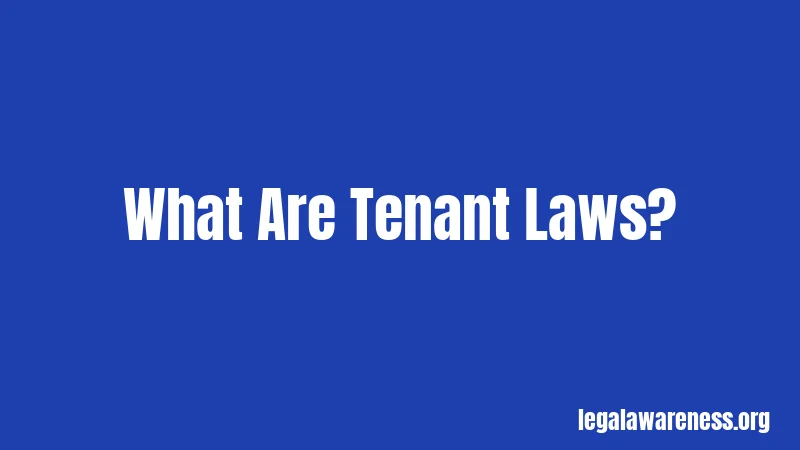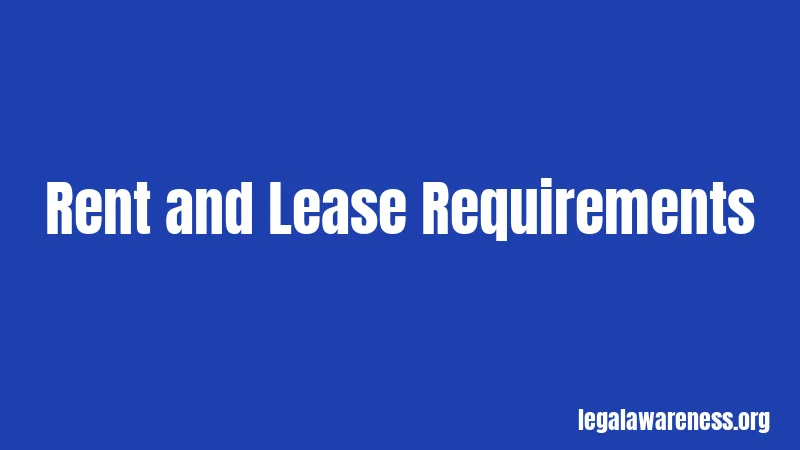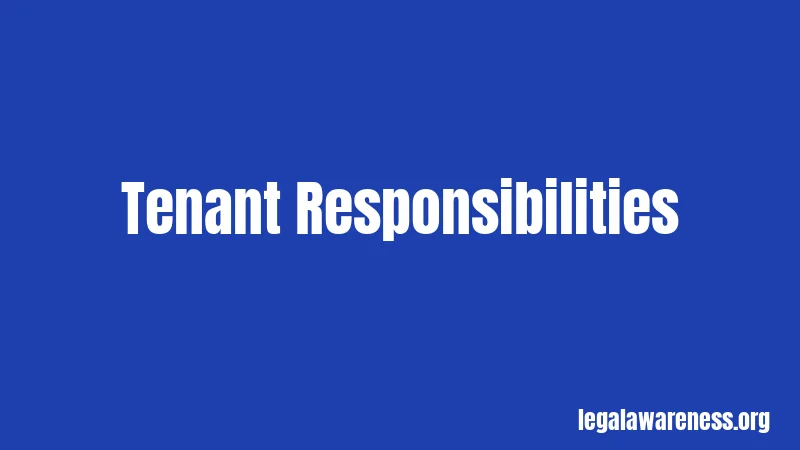Illinois Tenant Laws (2026): Your Complete Renter’s Rights Guide
Here’s something most renters don’t realize: you have serious legal protections. In Illinois, tenant laws are actually pretty strong. But honestly, a lot of people don’t know what those protections are until they need them.
This guide breaks down everything you need to know about renting in Illinois. We’ll cover your basic rights, what landlords can and can’t do, and what happens when things go wrong.
What Are Tenant Laws?

Tenant laws are rules that protect people who rent apartments or houses. They cover things like how much notice landlords must give before raising rent. They also protect you from unfair evictions and require landlords to keep homes safe and livable.
Think of them like a safety net. They’re there whether you know about them or not.
Basic Tenant Rights in Illinois
The Right to a Habitable Home
Your landlord must provide what’s called a “habitable” apartment. This basically means it has to be safe and livable. Here’s what that includes: working plumbing, electricity, heat, and a roof that doesn’t leak.
The landlord must also keep the building in good repair. If something breaks, they need to fix it within a reasonable time. Not sure what counts as “reasonable”? Generally, it’s a few days for serious issues like no heat. A few weeks for smaller problems like a broken cabinet.
Protection Against Unfair Eviction
Okay, pause. This one’s important. Your landlord can’t just kick you out. They need a legal reason, and they have to follow specific steps.
Valid reasons for eviction include: you don’t pay rent, you break your lease, or you cause serious property damage. Even then, they need to give you written notice first. For non-payment of rent, your landlord must give you 5 days’ notice. You then have a chance to pay what you owe. If you don’t, they can start eviction court proceedings.
If you’re evicted for other reasons (like breaking the lease), your landlord must typically give you 30 days’ notice. This gives you time to find a new place.
Security Deposit Protections
Your landlord can ask for a security deposit. But they can’t just keep it. Here’s how it works in Illinois.
Your landlord must put your deposit in an interest-bearing account. They can’t use your money for their own purposes. When you move out, they have 30 to 45 days to return your deposit. They can only deduct money for actual damage you caused. Normal wear and tear doesn’t count.
Here’s the important part: if your landlord doesn’t follow these rules, you can sue them. You could get back double or triple the deposit amount.
Right to Privacy
Your landlord can’t just walk into your apartment whenever they want. They need a good reason and must give you notice first.
In Illinois, landlords must give you at least 24 hours’ notice before entering. Valid reasons include: making repairs, showing the apartment to new tenants, or checking for lease violations. Emergencies are different. If there’s a fire or flooding, they can enter right away without notice.
Rent and Lease Requirements

Rent Payment Rules
Your landlord must tell you exactly when and how to pay rent. The lease should state the amount, due date, and where to pay it. If your landlord doesn’t specify, rent is due on the first day of the month.
Late fees must be reasonable. They can’t be excessive or designed to punish you. If you’re a few days late, your landlord can’t charge a huge fine. But stay on top of it, honestly. Late rent can lead to eviction.
Rent Increases
Wondering if your landlord can just raise your rent whenever they want? It’s a bit complicated. Here’s what you need to know.
During your lease term, your rent stays the same. Once your lease ends, your landlord can increase it. But they must give you proper notice. Illinois requires at least 30 days’ notice for increases. Some cities have stricter rules, so check your local ordinances too.
Your landlord must give you this notice in writing. The lease must also state the new amount and when the increase takes effect.
Landlord Responsibilities
Maintenance and Repairs
Your landlord is responsible for keeping the property in good shape. They must fix things that affect health and safety. This includes broken locks, plumbing problems, electrical issues, and heating failures.
What about minor stuff like a squeaky door? That depends. If it affects your safety or livability, they should fix it. If it’s just an annoyance, you might need to tolerate it. When in doubt, ask in writing. Send an email to your landlord describing the problem.
Heat Requirements
In Illinois, this rule is actually really specific. During winter, your landlord must provide adequate heat. Specifically, buildings with three or more units must maintain a minimum temperature. The requirement is 68 degrees Fahrenheit during the day and 62 degrees at night.
Not enough heat during winter? Document the temperature with a thermometer. Take photos. Then contact your landlord in writing. If they don’t fix it, you might be able to break your lease without penalty.
Lead Paint Disclosure
If your apartment was built before 1978, it might have lead paint. This is serious. Lead is toxic, especially for children.
Your landlord must tell you about any known lead hazards. They must provide you with a government information pamphlet about lead. You have 10 days to get the apartment inspected for lead. If you find lead, you can ask your landlord to fix it.
Tenant Responsibilities

Paying Rent On Time
You have to pay rent when it’s due. Pretty straightforward. If you don’t, you’re breaking your lease, and your landlord can evict you.
If you’re having trouble, talk to your landlord. Many will work with you if you communicate. Some might accept a payment plan instead of eviction.
Keeping the Apartment Clean
You must keep your apartment in reasonable condition. This means no major damage beyond normal wear and tear. Holes in walls, broken appliances you caused, and excessive dirt are problems.
Normal wear and tear includes: faded paint, minor scuffs, and worn carpet. Your landlord can’t deduct these from your deposit.
Following Lease Rules
Your lease is a contract. You agreed to follow the rules in it. These might include: no loud noise after certain hours, no smoking, no pets, etc.
Breaking these rules gives your landlord grounds for eviction. So read your lease carefully before signing.
Eviction Process and Rights
How Evictions Work in Illinois
Let’s talk about the steps. Your landlord can’t just change the locks and put your stuff outside. That’s illegal. They must go through court.
First, your landlord serves you with written notice. This is “Notice to Quit.” For non-payment of rent, you get 5 days. For other lease violations, you typically get 10 to 30 days depending on the issue.
If you don’t fix the problem (like paying rent) or move out, your landlord files in court. You get a court date. This is your chance to explain your side. You might argue the landlord didn’t maintain the property or didn’t give proper notice.
The judge decides. If the judge rules for your landlord, you have time to move out. The sheriff enforces the eviction if you don’t leave voluntarily.
Your Right to a Fair Eviction
Illinois law protects you from retaliation. Your landlord can’t evict you because you complained about code violations. They can’t evict you for calling building inspectors or joining a tenant organization.
If your landlord retaliates, you can fight the eviction. You might even sue for damages.
Staying in Your Apartment During Eviction
Here’s something important: the eviction process takes time. You don’t get kicked out the day after missing rent. You have days, sometimes weeks, to fix the problem or move out. Use this time wisely.
Fees and Deposits
What Fees Are Legal
Your landlord can charge certain fees. Rent is obvious. Security deposits are allowed. But what else?
Your landlord can charge for: late rent fees, fees for breaking your lease early, and fees for damage you caused. They can also charge for utilities if they’re not included in rent. But they must disclose all fees in writing before you sign the lease.
Fees can’t be unreasonable. A late fee of $500 for a $1,000 apartment would be excessive. Courts generally say late fees should be around 5 to 10 percent of monthly rent.
Returned Deposits and Deductions
When you move out, your landlord has 30 to 45 days to return your deposit or explain deductions. They must itemize everything. This means listing exactly what they deducted and why.
They can deduct for: unpaid rent, damage beyond normal wear, and cleaning (if you left it filthy). They can’t deduct for normal wear and tear. They can’t deduct for maintenance issues that were their responsibility.
If your landlord doesn’t return your deposit or explains deductions improperly, you can sue. You might win back double or triple the amount illegally withheld.
Special Lease and Housing Situations
Month-to-Month Rentals
Don’t have a formal lease? Many people rent month-to-month. The rules are still there. Your landlord must still give notice before raising rent (30 days) and can only evict for valid reasons.
Month-to-month doesn’t mean your landlord can kick you out whenever. It means either of you can end the arrangement with proper notice. Pretty straightforward.
Subsidized Housing and Section 8
If you get rent assistance through government programs, extra rules apply. Your landlord must follow state law plus federal rules. You have extra protections that regular tenants don’t have.
Talk to your case worker if you have questions. They can explain your specific rights.
Domestic Violence Situations
If you’re fleeing domestic violence, Illinois has special protections. You can break your lease without penalty in some cases. Your landlord can’t evict you or discriminate against you for leaving an abusive situation.
You’ll need documentation. Talk to a domestic violence organization for help. They can guide you through the process.
Discrimination and Fair Housing
Protected Classes
Your landlord can’t discriminate against you based on: race, color, national origin, religion, sex, disability, or familial status. These are called “protected classes.”
Discrimination might look like: refusing to rent to you, charging different rent, or providing different services. It can be obvious or subtle. If you’re treated differently because of who you are, that’s illegal.
What to Do If You Face Discrimination
Document everything. Write down dates, times, and what happened. Keep emails and texts. Take photos if relevant.
Then contact the Illinois Department of Human Rights or the federal Fair Housing Administration. They investigate discrimination complaints. You might get your deposit back, rent reduced, or even damages.
Reasonable Accommodations for Disabilities
If you have a disability, your landlord must make reasonable accommodations. This might mean allowing a service animal, even if the lease says no pets. It might mean allowing modifications to your apartment.
Your landlord can ask for documentation of your disability. But they can’t refuse you based on the disability itself.
Common Problems and Solutions
Landlord Won’t Make Repairs
You’ve asked multiple times. Nothing happens. What now? Stay with me here.
Send a certified letter describing the problems. Keep a copy. Give your landlord 14 days to respond. In many cases, you can then hire someone to fix it yourself and deduct the cost from rent. This is called “repair and deduct.”
But be careful. Some serious problems require landlord approval first. Consult a tenant rights organization before doing this.
Illegal Lockouts
If your landlord changes locks or removes your belongings without going through eviction court, that’s illegal. They’ve committed a “self-help” eviction. This is a crime in Illinois.
If this happens to you, call the police immediately. Then contact a lawyer. You might be able to sue for damages and get back into your apartment.
Withholding Rent to Force Repairs
Can you stop paying rent until your landlord makes repairs? Not exactly. It’s complicated, honestly.
In some situations, you can put rent in an escrow account. This means a neutral third party holds your money while the repair issue is resolved. But you must follow specific procedures. Get legal advice before trying this.
Frequently Asked Questions
Can my landlord raise my rent in the middle of my lease?
No. Your rent is locked in during your lease term. Once the lease ends, your landlord can raise it with proper notice (usually 30 days). But they can’t increase it while you’re still under contract.
What happens if I break my lease early?
Your landlord can sue you for the remaining rent. But they’re required to try to find a new tenant. They can’t just collect rent from you forever. If they find someone else, your obligation ends.
How much can my landlord charge for late rent fees?
Fees must be reasonable, usually 5 to 10 percent of your monthly rent. A fee that’s way higher might be unenforceable. Check your lease for the specific amount.
Can my landlord evict me for calling the health department?
No. That’s retaliation, which is illegal in Illinois. Your landlord can’t punish you for reporting code violations or health hazards. If they try, you can fight the eviction in court.
Do I have the right to a lawyer in eviction court?
You have the right to have a lawyer represent you. But Illinois doesn’t require the court to provide one for free. If you can’t afford a lawyer, contact a legal aid organization in your area.
Can my landlord enter my apartment without permission?
Not without notice. They need 24 hours’ written notice except in emergencies. Emergencies include fires, floods, or gas leaks. But they can’t enter just to check on things randomly.
Taking Action and Getting Help
Documenting Problems
Start documenting everything now. Keep a notebook or use your phone. Record: dates, times, what happened, and who was involved. Take photos of maintenance issues, damage, or code violations.
This documentation becomes crucial if you need to fight an eviction or sue your landlord. It proves what happened.
Communicating With Your Landlord
Always communicate in writing. Text, email, or certified mail. Avoid verbal conversations about important issues. Written records protect you.
Be specific. Instead of “the sink is broken,” say “the kitchen sink doesn’t drain and water backs up into the basin.” Include the date you first noticed the problem.
Getting Legal Help
You don’t need to navigate this alone. Several organizations help Illinois renters for free or low cost.
The Lawyers’ Committee for Better Housing provides free legal advice. The Tenant and Landlord Information Center answers questions about rights. Your local legal aid society helps if you can’t afford a lawyer. Search online for these organizations in your area.
Final Thoughts
You have real rights as an Illinois tenant. Your landlord can’t do whatever they want. Eviction isn’t instant. Your home must be livable. Your deposits must be returned.
The key is knowing your rights and standing up for them. Document problems. Communicate in writing. Don’t accept illegal treatment. If your landlord crosses a line, get legal help.
Stay informed, advocate for yourself, and when in doubt, reach out to a tenant rights organization. You’ve got this.
References
Illinois Residential Tenants and Landlords Rights Act – Illinois General Assembly
Illinois Department of Human Rights – Fair Housing
Lawyers’ Committee for Better Housing – Chicago Tenant Rights
Tenant and Landlord Information Center – Chicago
U.S. Department of Housing and Urban Development – Fair Housing
